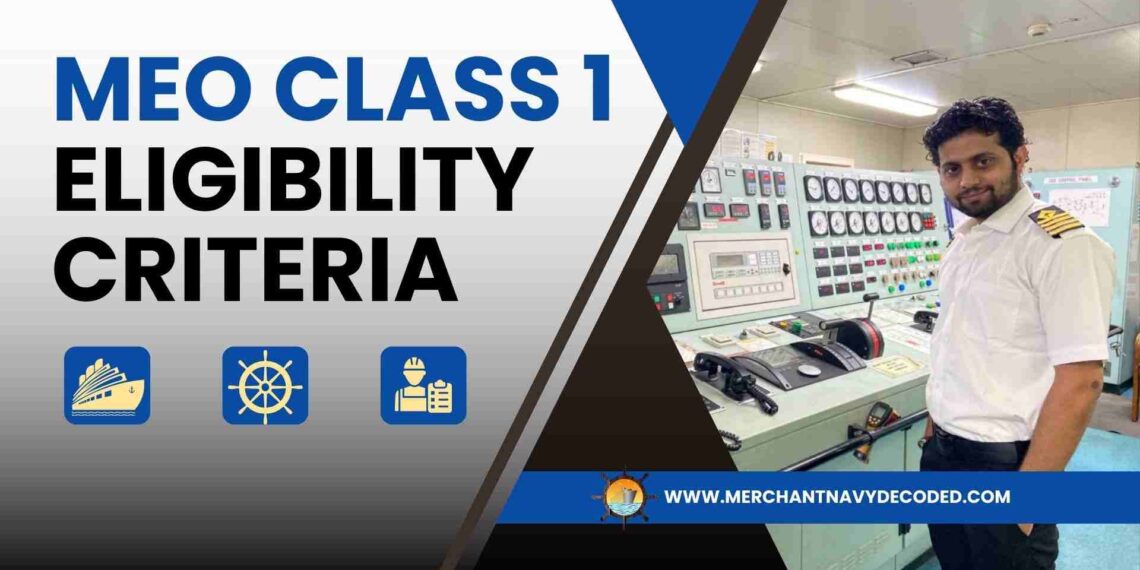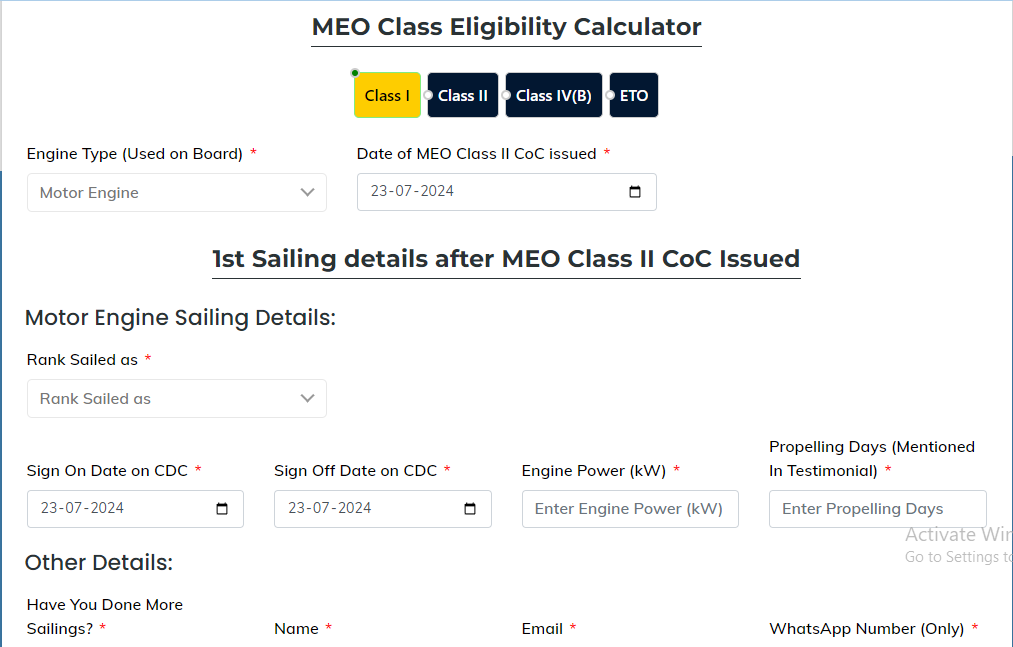MEO Class 1 Eligibility Criteria for 2024
1:- Overview
- Chief Engineer is the highest achievement for a marine engineer. The Chief Engineer is in charge of the engine department, ensuring everything runs safely and efficiently on a ship.
- To become a Chief Engineer, you need the Marine Engineer Officer (MEO) Class 1 Certificate of Competency (CoC). Here’s a simple guide to the eligibility criteria and exam process.
2:- Introduction to MEO Class 1
- MEO Class 1, or Marine Engineer Officer Class 1, is the highest level of competency certification for marine engineers, enabling them to serve as Chief Engineers on ships.
- This certification is issued by the Directorate General of Shipping, Government of India after candidates successfully pass the required examinations.
- After clearing both the written and oral exams, you will receive the MEO Class 1 CoC.
To get the complete information about MEO Class 1, enroll in our MEO Class 1 Guidance Series and learn about MEO Class 1 Eligibility, Exams, and syllabus.
3:- MEO Class 1 Eligibility Calculator
Are you eligible for the MEO Class 1 Certificate? Check out whether you are eligible for MEO Class 1 or not with our MEO Class 1 Eligibility Calculator.
4:- MEO Class 1 Eligibility
To be eligible for the MEO Class 1 Certificate of Competency (CoC) exam, candidates must meet specific sea service requirements as outlined by the Standards of Training, Certification, and Watchkeeping (STCW) 2010 amendments. These requirements have been in effect since January 1, 2015.
5:- Qualifying Sea Service Requirements for MEO Class 1
Candidates must fulfill the following sea service criteria to obtain the MEO Class 1 Certificate of Competency:
Qualified Sea Service: Candidates must have completed the necessary sea service experience as specified in the STCW 2010 amendments.
MEO Class 2 Certificate: Holding a MEO Class 2 Certificate of Competency and having served as a Second Engineer for a specified period.`
Medical Fitness: Possession of a valid medical fitness certificate as per DG Shipping standards.
| Regulation/ Category | Column A (Qualifying Sea Service) | Column B(Propelling Time) |
| STCW 2010 Regulation III/2 Chief engineer 3000KW or more | Total Minimum approved sea service after obtaining MEO certificate of competency class II (III/2) | Minimum watch keeping on main propulsion machinery while qualified to serve as 2nd engineer (holding III/2 certificate on ships of power 3000KW or more) |
| Motor (M) | 24 Months/ 18 Months if served as a second engineer officer on ships of 3000 kW propulsion Power or more for 12 months or Pro rata | 16 months/12 months if served as a second engineer officer on ships of 3000 Kw propulsion power or more |
| Steam (S) | 24 months/ 18 months if served as second engineer officer on ships of 3000 kW propulsion power or more for 12 months or pro rata | 16 months / 12 months if served as a second engineer officer on ships of 3000 kW propulsion power or more |
| Combined (steam and motor) | 32 Months (16 Month motor + 16 Month motor steam) | 24 months (12 months + 12 month steam) |
| Endorsement (steam or motor) | 9 months | 6 months |
| Minimum watchkeeping on main propulsion machinery while qualified to serve as 2nd engineer (holding III/2 certificate on ships of power 3000KW or more) |
To get complete MEO Class 1 Syllabus – CLICK HERE
6:- Conclusion
- To achieve the rank of Chief Engineer, obtaining the Marine Engineer Officer (MEO) Class 1 Certificate of Competency is crucial.
- The marine engineer who wants to become the chief engineer must fulfill specific sea service requirements, including experience as a Second Engineer with a valid MEO Class 2 Certificate.
- Marine engineers must also pass written and oral exams and complete a mandatory 2-month preparatory course from a DG-approved institute.
- Eligibility criteria to become chief engineer ensure that candidates have the necessary skills and experience to manage a ship’s engine department effectively.
Disclaimer :- The opinions expressed in this article belong solely to the author and may not necessarily reflect those of Merchant Navy Decoded. We cannot guarantee the accuracy of the information provided and disclaim any responsibility for it. Data and visuals used are sourced from publicly available information and may not be authenticated by any regulatory body. Reviews and comments appearing on our blogs represent the opinions of individuals and do not necessarily reflect the views of Merchant Navy Decoded. We are not responsible for any loss or damage resulting from reliance on these reviews or comments.
Reproduction, copying, sharing, or use of the article or images in any form is strictly prohibited without prior permission from both the author and Merchant Navy Decoded.





